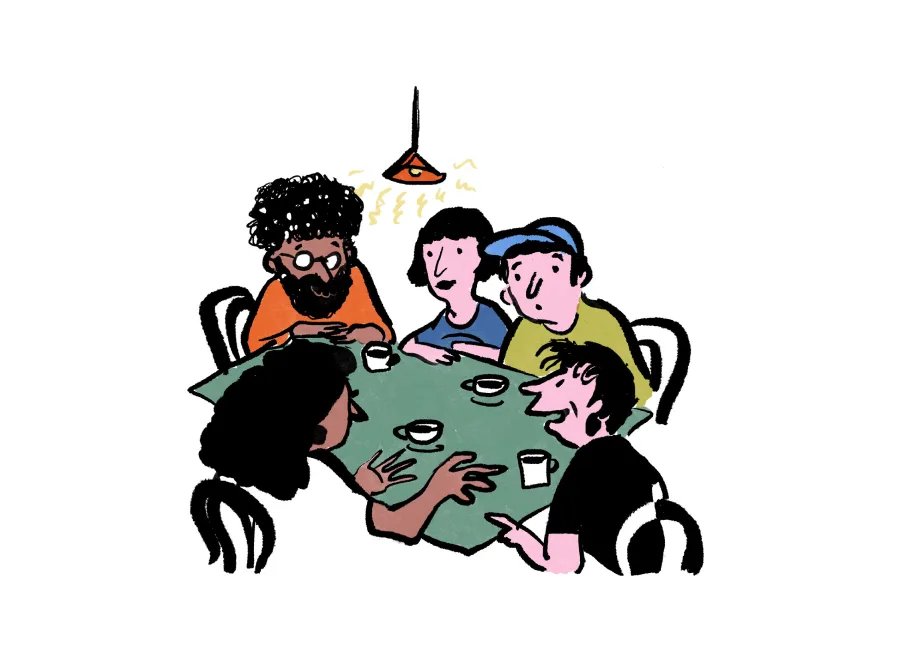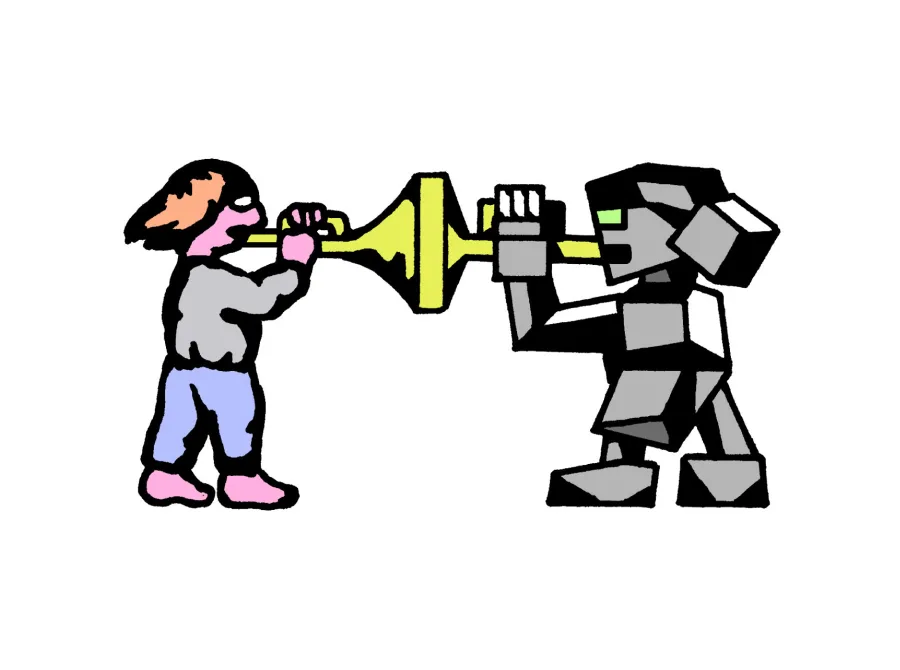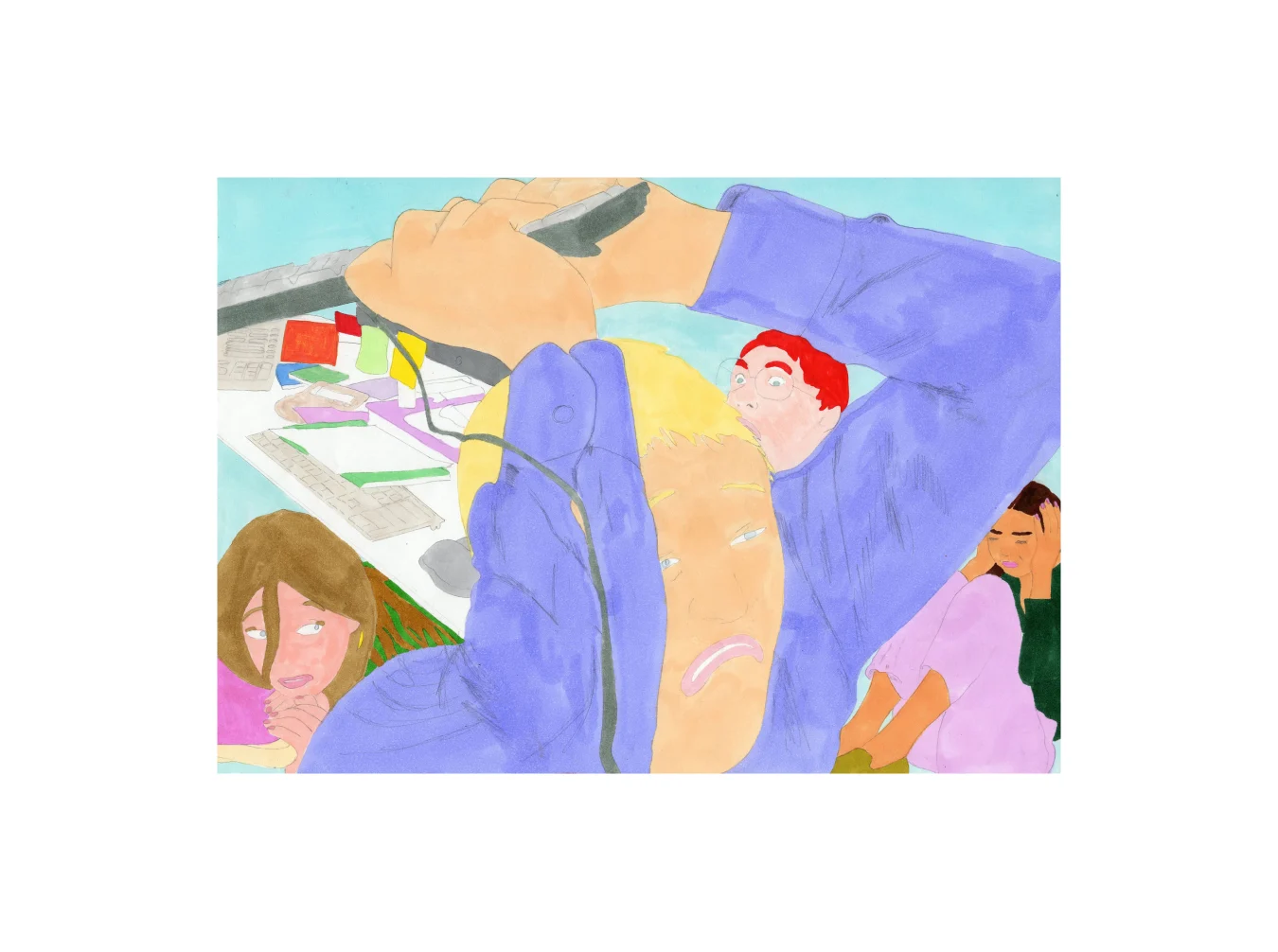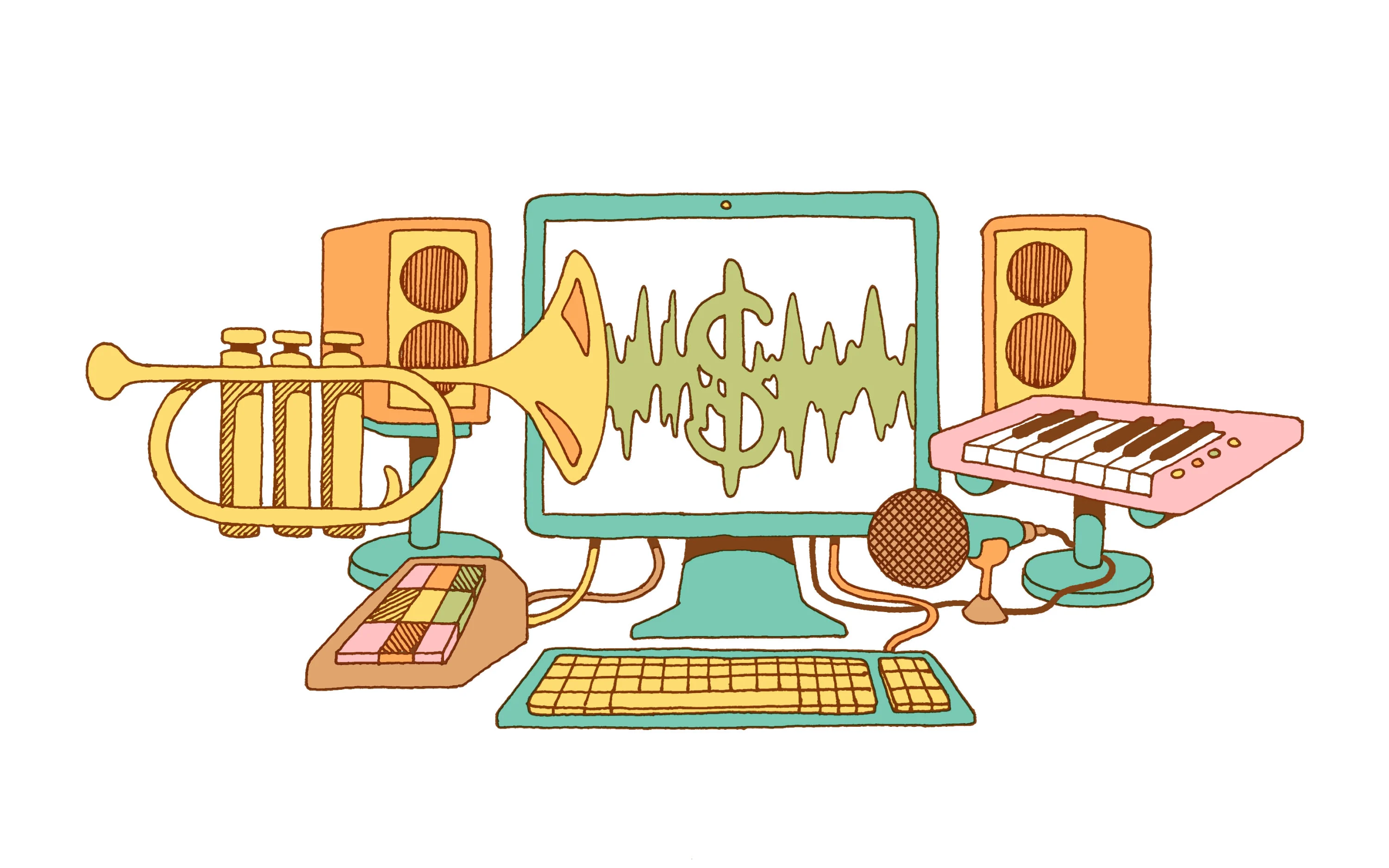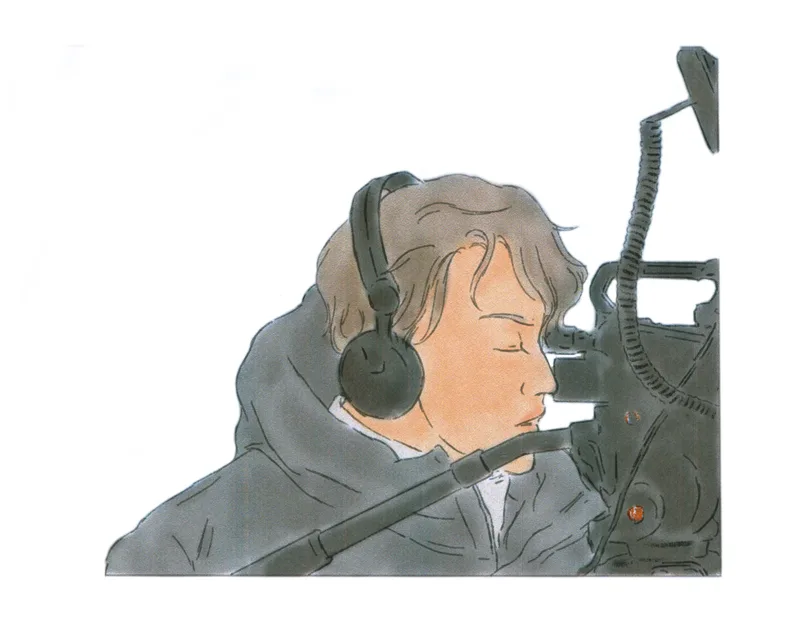

Whether for inspiration, education or to discuss career progression, the creative industries are littered with opportunities for public speaking. Unlike the rather more intimate and focused discipline of presenting work to clients, public speaking requires that you’re able to successfully showcase your personal or professional brand in front of a large group. Whether a smooth talker or an introverted mumbler, it’s something we all have to master eventually. James Cartwright is here to explain how.
Illustrations by Molly Fairhurst.
As someone who spends their days reading and writing for a living, quietly tucked away in a room on my own, I’m not naturally inclined towards public speaking. In fact, the very idea of it makes me rush with adrenaline. I’ve done plenty of it, too, sometimes in front of an awful lot of people. But with every new appearance before an audience I feel less inclined to ever take to the stage again.
While interviewing for this piece, I had a speaking engagement looming and as I put the finishing touches to my talk, found out that a relative’s funeral would be on the same day. I’m not a fan of funerals either, but there was a part of me that felt a deep relief when I realized I could shelve my talk for another time. It turns out fear is a stronger emotion than grief.
While I’m definitely not alone in my feelings of unease, others have risen to face their fears much more successfully than I have.
“I find it really difficult,” says illustrator Dan Woodger, who has overcome social anxiety to become a regular and proficient public speaker. “I’m not someone that even likes having a camera pointing at me, and I’ve always felt that my work should do the talking. But professionally we’re moving into more of a sharing culture and I think audiences naturally want to know more about the people behind their favourite artworks.”
He’s not wrong. Designers, photographers, animators and illustrators can all now be minor celebrities due to their reach on Twitter and Instagram, and audiences are keen to find out exactly what makes them tick. In acknowledgement of that fact, Dan’s diligently developed his public speaking prowess from small talks at universities to a main-stage slot at contemporary character design conference Pictoplasma.
“I may not be comfortable standing in front of an audience, but people are interested in it, and I have seen plenty of benefits. Getting myself out to these events means I've got an audience’s focused attention for half an hour or so. I can tell them the stories behind the work. I can show them the scale of effort that's gone into a project or tell them some funny anecdotes about how something was made. With Instagram culture you're jostling for a short bit of attention, whereas speaking directly to an audience means you can hold their attention for longer.”
Holding an audience’s attention for half an hour can lead to new opportunities. “The success of some studios has been sealed on stage from showcasing how they work,” says Nick Clement, co-founder of creative networking events, Glug. “Others have got new roles based on the talks they’ve done, launched companies, met new people, had new experiences and even been asked to do a TED talk.” A slot at Glug, it seems, can offer a stepping stone to all kinds of opportunities.
All of which can put additional pressure on an already nerve-racking experience. “Unfortunately, our society tends to put more value on those who can ‘own the room’,” says art director and designer Joanna Bird, who is naturally introverted and in the past has suffered from acute social anxiety. “Public speaking is undoubtedly more challenging for some rather than others, but I believe we fail as a society when we dismiss those who are quieter, prefer to listen, or share their knowledge in other ways.
“Every time I speak in front of an audience of any size I am incredibly proud of myself. My anxiety very rarely lets me get through these occasions without suffering to some degree, so each one successfully survived is a huge achievement.”
Love it or loathe it, public speaking is just another facet of the creative landscape that you need to learn to navigate, so here are a few tips to help you work the room.

Don’t worry if you fuck up
Repeat this mantra to yourself for at least a day before you take to the stage. Rule number one of public speaking is to not worry about public speaking. If you let the fear get to you, then your talk will be so much harder, so go easy on yourself and try to take the mistakes in your stride.
“If anyone’s ever been to an event of ours then you’ll know that cock-ups happen a lot.” says Nick. “We even have a list of rules on the opening slides that say ‘Something will fuck up’. This sets expectations and probably calms the speaker’s nerves a little.”
While not every public speaking engagement will have the same relaxed atmosphere as Glug, the sentiment remains valid. If you fuck up, it really isn’t the end of the world.
“I believe that people really are empathetic,” says Joanna, “and that those who may discount your credibility for stumbling over your words probably don't deserve your time.”
Practice. Then practice some more
Practice might not make your talk perfect, but it’ll definitely make it better — unless you’re one of those truly lucky people who can improvise on the fly. Most people aren’t, so practice, practice, practice, just to be on the safe side.
“Each time I do a talk I realize the bits that work, the bits that don’t, and then just kind of refine it and refine it,” says Dan. “Sometimes that involves pacing back and forth in my living room on my own with my laptop synced up to the TV. I can just deliver it to myself with no one around and just try to get the pacing and delivery right.”

Get someone else’s perspective
You might think you’ve prepared a killer talk that will knock your audience dead, but wouldn’t you like that confirmed by someone else before you take to the stage? Of course you would!
“Whether it’s an agent or a friend, it’s good to run your talk by someone else beforehand,” says Dan. “I think it's really useful to give you a sounding board about what does and doesn’t sound good. Doing a trial run and having a little bit of approval before you have to get up in front of other people can really help you to feel prepared.”
Give your audience what they need
We’ve all come across people who re-hash the same old talk in front of multiple audiences, but the best talks take an audience’s needs into account. What you communicate to an auditorium of peers should be different to what you present to a roomful of students or at a conference with a specific theme. Don’t be that guy who just talks about finding beauty in everything all the time. We’ve heard that talk, we really don’t need to hear it again.
“The thing I hated about some of the professional talks that I was given at university was that sometimes they came off as arrogant,” says Dan. “The ones I found more valuable were more honest and spoke about the difficulty of building a career. They were much more reassuring to an undergraduate.”

Opportunities could be waiting in the audience
It could be a career-defining commission, it might just be a small brief that helps pay next month’s rent, but when public speaking, opportunities are abundant.
“You never know who’s in the audience or who you’ll be on stage with,” says Nick. So never assume you can put less effort into a talk just because it seems informal or low-key.
“The last talk I did there were a couple of people from Cartoon Network in the audience, and we've kept in touch,” says Dan. “They're really keen for me to let them know as soon as I’m ready with a pitch for an animated show.”
Sure, Cartoon Network execs aren’t sat in every talk around the world, but you get the drift; opportunities are everywhere.

Know when to say no
“Talks often lead to more talks,” says Luke Tonge, founder of Birmingham Design Festival, “so they’re rarely useful for your productivity because of how little they pay and the amount of time they take.” If you can’t think of a good reason to speak at an event, or think of an objective you want to achieve, then maybe it’s best not to bother.
“A great discipline for the public speaker is to know when to say no,” says Luke. Don’t just say no because you’re nervous though. That’s cheating.
Be yourself
We can’t all be shit-hot public speakers, but trying to copy the people that are certainly won’t help you improve. It’s important to make sure that your personality is present in the way you present. If you’re naturally funny then play up to that, if you revel in details then try to communicate that too. If you’re shy and retiring then it’s perfectly fine to present that side of yourself. Not everyone is a larger-than-life creative celeb and the world would be an achingly egotistical place if they were.
“Don't bung a load of things into your talk that you've seen other speakers do,” says Luke. “Find your own voice.” I agree. It might sound trite, but whatever. Just be yourself.

